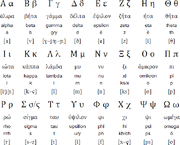| Spoken by: | 13.5 |
|---|---|
| Spoken in: | Greece, Cyprus |
| Language family: | Hellenic (Indo-European) |
Greek (Ελληνικά (Elinika)) is an Indo-European language spoken in Greece and Cyprus. Greek is the official language of Greece and one of the official languages of Cyprus. It has been estimated that 12% of English vocabulary is of Greek origin.
Phonology[]
Greek poses some phonological challenges to English speakers. Vowels are not difficult--there are only five: the a (father) (e.g. α), i (machine) (e.g. ι), e (ever) (e.g. ε), o (lower) (e.g. ο), u (soup) (e.g. ου). The consonant inventory presents more challenges, however. Two sounds are present in Greek that are not present in English: the velar fricatives; χ and γ (said like the x in lox, though farther back in the mouth, and something like a rolled g, respectively). Greek has a rolled or tapped 'r', which is difficult for some English speakers. Additionally, native Greek speakers usually have a retroflex s--an s consonant that is somewhere between English's s and sh sounds, though this is a minor point. Finally, some Greek consonant clusters may be challenging, e.g. εχθρός (exthros).
Very important also is that Greek has an accent system that can significantly affect the meaning of a word. Unlike tonal languages, the accent is a function of volume and vowel length--simply say the accented syllable for longer. Most words only have one accent, but nouns in some declensions can have two. C. p. μαλακά (softly) w/ μαλάκα (a**hole!)).

Greek alphabet with names of letters and pronunciation
Grammar[]
Greek has several grammatical features foreign to monolingual English speakers. The first is grammatical gender, of which Greek possesses three. Greek is a pronoun-dropping language as it is an inflective language--information about the subject of a verb is encoded in the verb itself. Greek declines its nouns according to four cases, of which the genitive also serves as a dative. Greek verbs do not have an infinitive conjugation, so the marker να (to) is added to verbs to create it. Finally, Greek is one of the few languages that possess the medio-passive voice for verbs--verbs thus may be conjugated in two different ways according to subject depending on if the speaker means that the action is being done to him/her or to some other object he/she will then specify; e.g. τρώω (I eat) τρώγομαι (I am eaten).
Orthography[]
Greek orthography can be challenging for non-native speakers. Greek is written in the Greek alphabet, with two diacritics. The first, the acute accent, is used to mark the accents of words. The second, the umlaut, separates pairs of vowels that would otherwise be diphthongized.

Greek language diphthongs.
The difficulty in the Greek language is that many diphthongs and indeed letters are pronounced the same way. While there are some rules that can aid in choosing which of the options to use, as a general rule, the spelling of a word is dependent on its etymology, which a non-scholar cannot be expected to know. Thus, reading Greek is a an unambiguous process (with the exception of the diphthong αυ and εθ), while writing Greek is a matter of knowledge (or spell-checking).
Common Difficulties[]
The Foreign Service Institute has classified Greek as a "Hard" language. It is estimated that learning Greek to a Professional Working Proficiency in the language (a score of Speaking-3/Reading-3 on the Interagency Language Roundtable scale) will take an average of 44 weeks (1100 class hours).[1]
Resources[]
Pimsleur offers a course in Greek.
Duolingo offers a course in Greek.
Rosetta Stone offers a course in Greek.
References[]
- ↑ U.S. Department of State; FSI's Experience with Language Learning; https://www.state.gov/m/fsi/sls/c78549.htm